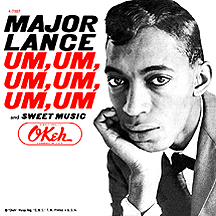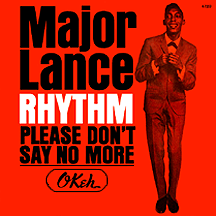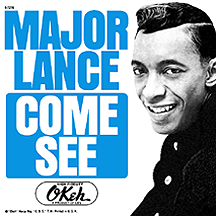MAJOR LANCE
Okeh Records, Chicago, Illinois. Where the trombone was the backbone! That's how it was, at least, according to Carl Davis. He and his arrangers intentionally used horn sections in all of the label's productions in the 1960s. Trumpets and, more prominently, trombones, along with heavy use of strings and a touch of Latin influence gave Davis's brand of "Chicago Soul" its own distinctive sound, so it would be easily recognizable and stand apart from the music of Detroit's Motown, Philadelphia's Cameo-Parkway, L.A.'s Philles, or the Memphis groove of Stax-Volt. More than just about any other act, those trombones were the trademark of Major Lance's string of hits.
Major (his real first name) grew up on the northwest side of Chicago in the Cabrini-Green projects, a high crime area. One of his neighbors was a kid named Curtis Mayfield. Attending nearby Wells High School in the mid-'50s, the two were also tight with Jerry Butler. All, of course, would later have successful music careers. Another of his friends, Otis Leaville (who would make his own mark with a few hits, including "I Love You" in 1969), worked together at a drug store and shared interests in singing as well as boxing. Lance trained for awhile as a fighter, but his most impressive accomplishments weren't in the ring; instead, he became a dancer around 1959 on a local television show, Jim Lounsbury's Record Hop, showing off some of the boxing moves he'd learned on the dance floor. Lounsbury used his connections to get him an in with Mercury Records, and Mayfield (who'd tasted chart success by this time with "For Your Precious Love" as a member of Jerry Butler and The Impressions) wrote and produced Major's one single release for the label, "I Got a Girl," in 1960. Nothing much happened with the record, and it was back to the drug store and other odd jobs for the next couple of years.
Mayfield and Butler, meanwhile, made a professional (but not personal) split: Jerry clicked with a succession of hits beginning with "He Will Break Your Heart" in late 1960, and Curtis regularly contributed as a songwriter, musician and background vocalist. The Impressions, with Curtis singing lead, got rolling a year later with "Gypsy Woman." Their friend Major stood on the sidelines. After working with Gene Chandler, another Chicago-area singer whose "Duke of Earl" had hit number one in 1962, Carl Davis was hired by Columbia Records in the spring of '63 to work in artists and repertoire for the Okeh label. Dating back to 1918 (a Columbia subsidiary since '26), Okeh's early success had been with jazz and blues recordings, then there was a hot run the 1950s with Johnnie Ray, Chuck Willis, Big Maybelle and others in a more R&B direction, followed by an early-'60s slump. Carl set to the task of getting Okeh back on top. Over the next few years he signed Detroit singer Walter Jackson and Los Angeles-based Ted Taylor (formerly with The Jacks and The Cadets), in addition to homegrown Chicago acts including Jerry's brother Billy Butler and his group The Chanters. But before any of these artists, there was this cat named Major Lance who kept hanging around bugging him. Carl had to figure out how to get rid of the guy!
Major was constantly showing up at the Okeh offices, offering to run errands for Davis, telling him about the record he'd once made and how he and Curtis Mayfield were friends from way back. That last bit of info, of course, was true, and with Mayfield's support, Davis gave the singer a shot. Curtis came up with the song "Delilah," a good first effort that didn't quite work. Davis felt that Major had shortcomings as a vocalist, so he began using the Impressions as background singers to compensate in spots. The brass instruments that were becoming an important part of his formula also were arranged to fill in where Major couldn't hit a note or just plain fell short. Over time his vocal abilities improved, but when it came to stage presence, that was another thing. He was a dynamic performer from the start, thanks in part to his training as a boxer and experience as a dancer on TV. The end result was a style more polished and mainstream than many R&B artists of the time (Berry Gordy's Motown stable of stars being an exception). The second Okeh single was his breakthrough.
Mayfield was keeping himself very busy in '62 and '63, writing and producing Butler, Jan Bradley and his own Impressions, often sitting in as a guitar player on the sessions. Adding to the workload, he was determined to help make something happen for his old friend. "The Monkey Time," in the summer of 1963, was the first of several songs by Curtis to hit big on the charts for Major Lance. The dance record went top ten in September, with The Miracles' "Mickey's Monkey" (also top ten) climbing the charts a few weeks later, launching a brief "Monkey-Mania" on dance floors that year. Curtis kept his clever creations coming for the likable Lance. "Hey Little Girl" (containing a lyrical nod to "Monkey Time") was almost as big a hit in the fall.
Besides having one of the strangest titles ever, "Um, Um, Um, Um, Um, Um" strayed from the usual romance and/or dance subject matter; it's essentially about a man in the park mumbling incoherently. But what a great sound it had, with Major's vocals backed by Johnny Pate's deftly arranged horn section. It was a top ten pop and number one R&B hit in February 1964, the biggest of Major's career. A dance record showing off Mayfield's latin-flavored guitar skills, "The Matador," was next, taking him back to the top 20. This one written by Davis, Billy Butler and Lance, it required Major to demonstrate the dance in his live performances, emulating the way a matador swirls his cape, following through with a "bull-stabbing" movement. The strong arrangement overcame the bizarreness of the message.
The next few singles were solid Curtis Mayfield-written efforts, highlighted by "Rhythm," another big hit employing the now-signature Chicago sound. Regular musicians on the sessions included drummer Maurice White and trombonist Louis Satterfield (who would continue their association in the '70s with Earth, Wind and Fire). The hitmaking formula established by Carl Davis was running its course for Lance, though the distinctive brass-and-string arrangements would be key to the works of Chandler, Butler, Fontella Bass, Billy Stewart, The Vibrations and scores of Chicago artists throughout the decade.
"Come See" slipped into the top 40 for one week in April 1965. Successive releases met with less success. Pate and Davis departed over the next couple of years, while Mayfield immersed himself in the rise of The Impressions. Still, Lance was the best-selling of all the acts on the Okeh roster in the 1960s. The label made an unusual choice in teaming him with Billy Sherrill (a country music producer in Nashville on the verge of bigger things with Tammy Wynette) and later with producers Ted Cooper and Gerald Sims, yet nothing sparked. Leaving Okeh in 1968, he recorded for many labels over the next decade, staying on the fringe of the record industry with minor hits "Follow the Leader" in 1969 on Dakar and "Stay Away From Me (I Love You Too Much)" in 1970 for Mayfield's Curtom Records. Other releases were on the Volt, Playboy, Columbia and Soul labels. Not yet 40 in 1978, things went seriously downhill when he was busted for cocaine possession and served a three year prison sentence. After his release in 1982, he performed on the oldies circuit, his health gradually failing him until, at just 55 years of age, he died of heart failure in 1994. Those last 15 years or so are best left forgotten by all but the family and friends closest to Major Lance. The rest of us can reminisce about the time he was at the top of his Chicago Soul game.
NOTABLE SINGLES:
- I've Got a Girl - 1960
- Delilah - 1963
- The Monkey Time - 1963
- Hey Little Girl - 1963
- Um, Um, Um, Um, Um, Um - 1964
- The Matador - 1964
- It Ain't No Use /
Girls - 1964 - Rhythm - 1964
- Sometimes I Wonder - 1964
- Come See - 1965
- Ain't it a Shame - 1965
- Too Hot to Hold - 1965
- Everybody Loves a Good Time - 1965
- Investigate - 1965
- It's the Beat - 1966
- Without a Doubt - 1968
- Follow the Leader - 1969
- Stay Away From Me (I Love You Too Much) - 1970
- Must Be Love Coming Down - 1971




